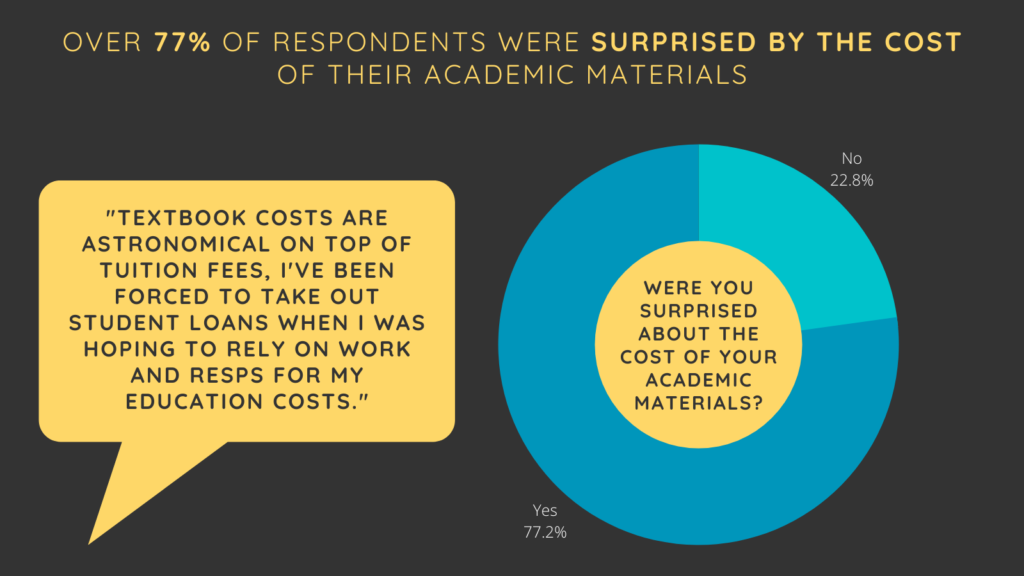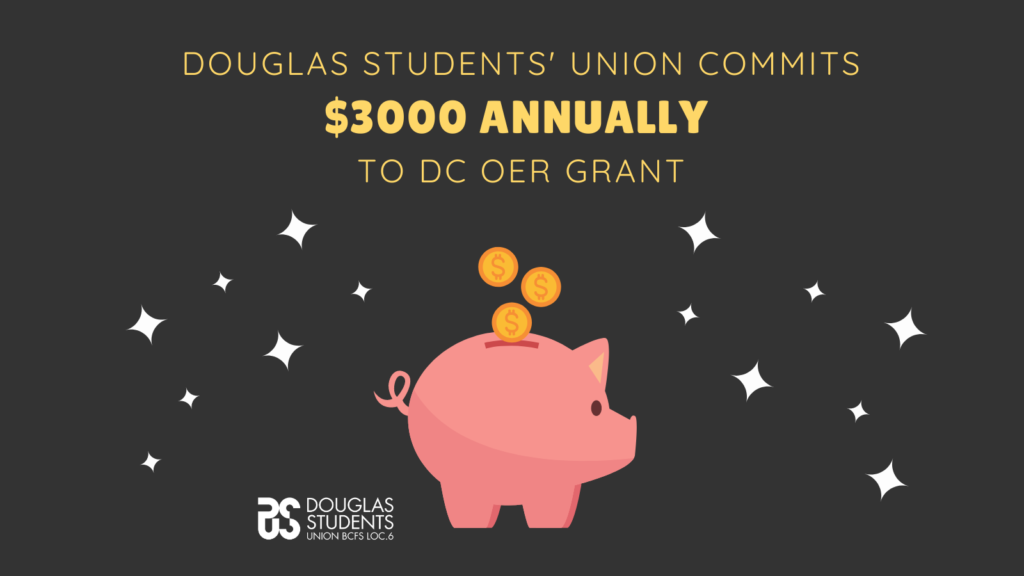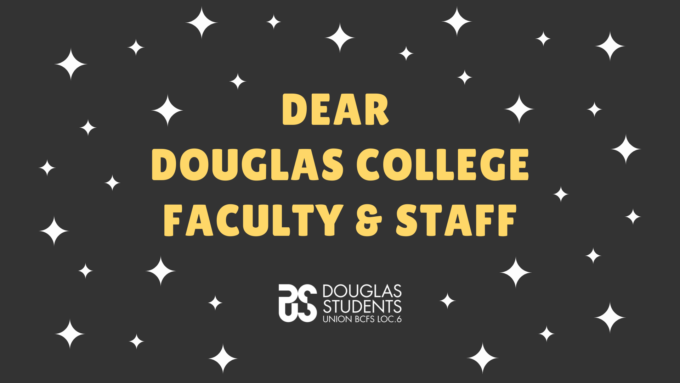Academic Materials Survey
In fall 2020, the DSU launched the Academic Materials Survey to learn about student experience with academic materials. We gathered info from students that included how much tuition and textbooks costs, the cost and usage of access codes and perspectives on Open Educational Resources (OERs). You can read the results and our full report from the Survey here.
In fall 2021, following the release of the survey results, DSU Board members Doyin Agbaje and Mehre Dlir were invited to submit a blog post to Douglas College website. You can read our full blog post submission here.
Here’s what you’ve told us:
- Over 77% of students were surprised by the cost of academic materials (and not in a good way)
- Over 74% said that academic materials cost more than expected (what a horrible surprise)
- Over 70% of students did not buy recommended materials because it was cost prohibitive
- 66% of students had to pay additional money for access codes (another bad surprise)
- Over 90% would use an OER if it was available as an option
- Students would utilize different options to access OERs – print, digital and a combination of both





Thank you to all the students that participated – the info and comments we received will help us continue to lobby and advocate for increased access and alternatives to traditional commercial textbooks and at the end of the day, help YOU save on your education costs!
Don’t drop the course, drop the textbook.
The high cost of textbooks has nearly doubled since 2002. In addition to ever-increasing tuition fees and ballooning student loan debt, textbook costs are creating further obstacles fo student success in the classroom. In fact, a majority of BC post-secondary students report that they don’t buy their textbooks – this can have serious negative effects on learning outcomes.
Open Educational Resources (OERs) are accessible, affordable and customizable. They increase access to knowledge and the quality of learning, both of which improve student success.
What are OERs?
OERs come in many forms: full courses, lesson plans, videos, games, textbooks and online simulations (just to name a few). These are available in digital formats for free or in print at a very low cost. The implementation of OERs in classes will save students from over-priced textbooks without sacrificing high-quality education.
In the past 5 years, open textbooks have saved students nearly $5 million; more funding will result in more materials and save students money one class at a time! All it takes to expand the program is a commitment from instructors and administration to make saving students money a priority.

These examples of OERs are all used at Douglas College, free as digital copies and available in print format for only a fraction of the cost of a regular textbook!
Success at Douglas College
Douglas students have made our campaign a tremendous success. Out of all of the institutions in the province, Douglas College ranks first in OER adoption rates – since 2013, almost 17,000 students have saved over $2 Million from OER adoptions that have replaced traditional commercial textbooks!
The Douglas Students’ Union contributed to and supported the creation of the Douglas OER Grant for Douglas faculty members to create new OERs for their courses – since the grant began in Winter 2018, 49 grants have been awarded leading to increased adoptions of Open Education Resources (OERs) at Douglas.
Douglas Students’ Union contribution to Douglas College OER Grant
 For Open Education Week 2021, we are proud to announce our annual $3000 contribution to the Douglas College OER Grant! Our $3000 each year will support new OER adoptions. We are committed to increasing awareness, usage and implementation that will lead to better access and educational cost savings for students!
For Open Education Week 2021, we are proud to announce our annual $3000 contribution to the Douglas College OER Grant! Our $3000 each year will support new OER adoptions. We are committed to increasing awareness, usage and implementation that will lead to better access and educational cost savings for students!
Goals:
- Save students money on textbooks by increasing adoption of OERs at Douglas College
- Bust myths surrounding open educational resources and open education
- Promote and support adoption of open textbooks and other materials among faculty
- Support the efforts of the BC Federation of Students and BC Campus (BC’s provincial open textbook research organization)
Background
The high cost of textbooks is creating obstacles for students to be successful in classes. Since 2002, the cost of textbooks has nearly doubled. In fact, 26% of BC students choose to not register for a course due to textbook costs, which negatively impacts their academic career.
An alternative solution is the implementation of Open Education Resources (OER). OERs come in many forms: full courses, lesson plans, videos, exams, and textbooks. These are available in digital formats for free or in print at a very low cost. The implementation of OERs in classes will save students from over-priced textbooks without sacrificing high-quality education.
In the past 5 years, open textbooks have saved students more than $6 million; more funding will result in more materials and save students money one class at a time! All it takes to expand the program is a commitment from instructors and administration to make saving students money a priority.

Join us & take action to get more OERs at Douglas College!
Join the online provincial conversation on OERs by following #textbookbrokeBC, and posting online your experience with OERs. You can also tweet your textbook receipt using the hashtag #textbookbrokeBC to share how the rising costs of textbooks are affecting you.
Talk to an instructor you think would be interested in adopting open education resources, or point them to your institutions library for information on OERs. You can also contact your students’ union if you’re interested in talking to your instructors, but would like more support getting started.
Find Out What Douglas College Courses Use OERs
OERs at Douglas College arrow_forwardProgress
Open Access Week
Coming up: October 24-30
Open Access Week is an opportunity for the academic and research community to continue to learn about the potential benefits of Open Access, to share what they’ve learned with colleagues, and to help inspire wider participation in helping to make Open Access a new norm in scholarship and research.
This years theme is: Open For Climate Justice, which seeks to encourage connection and collaboration among the climate movement and the international open community. Sharing knowledge is a human right, and tackling the climate crisis requires the rapid exchange of knowledge across geographic, economic, and disciplinary boundaries.

